Protective Eyewear Market by Product Type (Safety Spectacles, Welding Shields, Safety Goggles, Others), Material (Polycarbonate, Glass, Other Material), End-use Industry (Industrial, Healthcare, Defence, Sports), and Region (2025-2030)
The protective eyewear market is projected to grow from USD 4 billion in 2024 to USD 5 billion by 2030, at a CAGR of 4.5% between 2025 and 2030. Different end-user industries drive the market for protective eyewear through stricter safety regulations, the rising awareness regarding the use of eye protection, and the increasing need to prevent workplace injury accident. More stringent safety standards and regulations in industries such as construction, manufacturing, and chemicals have necessitated increased demand for protective eyewear to minimize the risk of eye injury due to debris, chemicals, and physical impacts. In the health segment, growing requirements have emerged for protection against infectious agents and exposure to radiation. Participation in outdoor sports is increasing, leading to an increase in demand for protective eyewear with UV filters. Numerous technological innovations, for example, lightweight materials, anti-fog coating, and more comfort, have become a growing driver for the use of protective eyewear in different applications.
Attractive Opportunities in the Protective eyewear Market
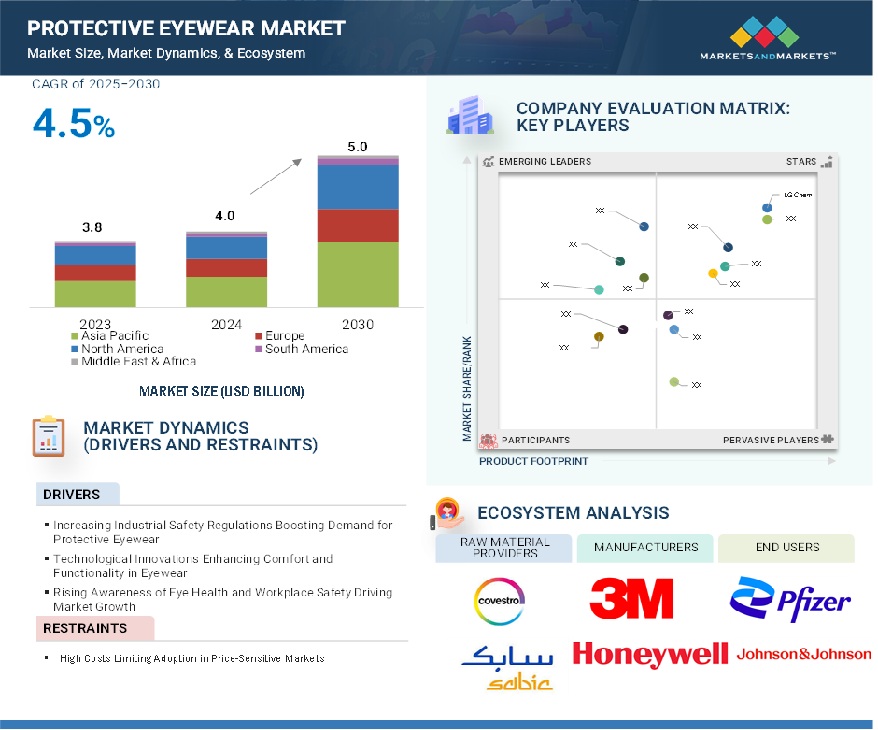
Source: Interviews with Experts, Secondary Sources, and MarketsandMarkets Analysis
To know about the assumptions considered for the study, Request for Free Sample Report
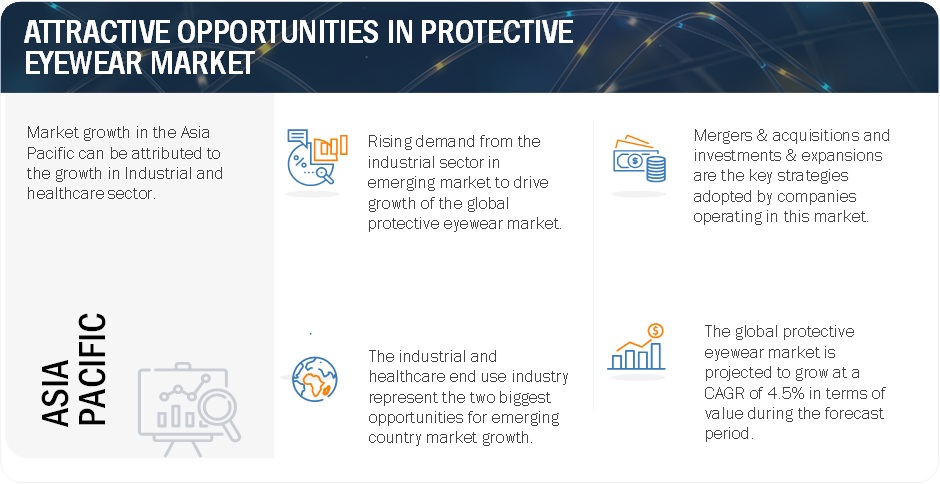
Source: Expert Interviews, Secondary Sources, and MarketsandMarkets Analysis
Protective Eyewear Market Dynamics
Drivers: Rising Awareness of Eye Health and Workplace Safety Driving Market Growth
Awareness of eye health and workplace safety reasons will lead to higher growth in the protective eyewear market. As employees and employers become more aware of possible dangers from injury to the eye, the trend moves toward higher safety measures. The drafted safety services are essential in high-risk industries like construction, manufacturing, and chemicals to prevent damage to eyes due to debris, chemical, or radiation exposure. Moreover, the general establishment of workplace safety requirements led by bodies like OSHA is now forcing the nose of the companies into employee protection. Public awareness campaigns show the importance of eye health and education, which is expected to translate into more demand for eyewear protection against long-term damages due to UV exposure, screen time, and environmental hazards.
Restraints: High Costs Limiting Adoption in Price-Sensitive Markets
One of the barriers to widespread adoption of protective eyewear in price-sensitive markets is price; this form of protective eyewear can be too much for advanced end-user industries. It features characteristics such as anti-fog coatings, UV protection, or some durable polycarbonate lenses that make it pricey and tough to invest in huge numbers of these products in industries with quite limited budgets or developing regions. Industries like construction or manufacturing often have large workforces needing protection. Hence, high-quality eyewear ends up straining the financial resources. This is especially true in a small to medium-sized business level, where they can be inclined to buy cheaper and not very good eyewear. Furthermore, it may even discourage employees from using the right type of eye protection to workers if they are not yet that much aware of safety regulations within emerging markets due to the prohibitively expensive upfront cost of safety eyewear.
Opportunities: growing demand for personalized protective eyewear
Increasing demand for personalized protective eyewear creates a new opportunity area for the industry. Manufacturers can use cutting-edge technology today to supply tailor-made eyewear solutions such as prescription lenses, customized fits, and coatings tailored for people. It would help to give the following benefits to a greater extent customer base focusing on areas such as healthcare services or sports and high-risk industries, in addition to enhancing the general overall experience and comfort.
Challenges: regulatory compliance across diverse regions
There is a challenge about compliance regulations in a wide range of areas for the protective eyewear market. Different countries and sub-industries have different safety standards and certifications for use in protective eyewear, which makes it difficult to manufacture all the products as per prototype designs for different countries as well as the different industries. It increases the production costs and delays in entering the market and may further lead to potential lawsuits by firms selling their eyewear globally.
Protective Eyewear Market: Ecosystem
The whole ecosystem of protective eyewear comprises significant players and stakeholders like the manufacturers, suppliers, distributors and end-users. Manufacturers make prescription eyeglasses from polycarbonate, acrylic and glass, some of them with anti-fog treatment, UV protection and impact resistance. Distributors and retailers are the final link for end-users in many industries, including construction, health care, automotive, and sports. Safety standards set by regulatory bodies such as OSHA and ANSI were developed to ensure conformity on protective criteria. The workforce, athletes, the health care workforce, and health professionals are all end users of protective eyewear, with the demand driven by these burden bearers. Continued progress in technology and innovation aligns with the dynamics of the eyewear market.
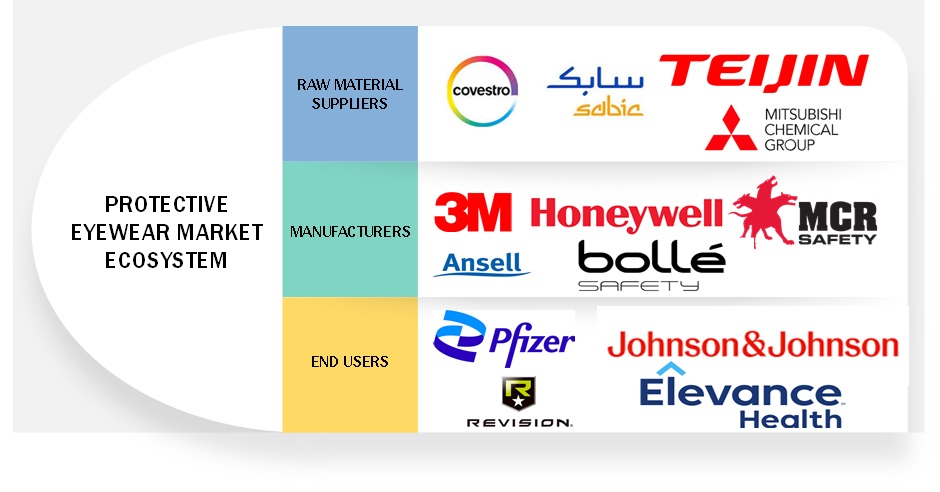
By material type, polycarbonate is one of the fastest growing segment of the protective eyewear market in terms of value
With the most impact-resistant, lightweight built-in UV protection, polycarbonate is one of the most dynamic segments in protective eyewear for the form and by functional usage. It has durability and is lighter than many other materials, such as glass or acrylic, which makes it most excellent choice for these types of lenses found in applications like construction, manufacturing, and health services. Also, seeking comfort and safety properties, customers expect that polycarbonate lenses are resistant to high impact forces and scratches. Polycarbonate innovations in the form of anti-fog coating technology and optical clarity further fuel the fire of growth in the market demand.
By product type, safety goggles is one of the fastest growing segment of the protective eyewear market in terms of value
protective eyewear, goggles are growing quite rapidly in this segment due to increased protection and adaptability. They provide a higher degree of protection from very fine airborne particles, chemicals, and conditions beyond environmental extremes; therefore, they are critical in industries such as construction, manufacturing, healthcare, and laboratories. The increasing need for safety in workplaces and growing safety regulations is further adding to the demand for safety goggles. With innovation trends such as anti-fog lenses, advanced comfort functions as well as better fit attributes of safety goggles, they will have more sales. Increasing usage of safety goggles will not only push their use across a wide range of industries but also increase application areas within health care, which will contribute to a higher market valuation.
Asia Pacific is the fastest-growing protective eyewear market
Asia Pacific is expected to be the fastest-growing markets for protective eyewear due to rapid industrialization, increasing safety regulations, and growing awareness of eye protection. Some of those countries are already undergoing significant growth in construction, manufacturing, and chemicals; China, India, and Japan are among those countries. All these factors require needing protective eyewear to prevent eye injuries. Moreover, the great rise in outdoor sports and healthcare activities increases the scope of the market. The increasing middle class in the region and their knowledge about workplace safety are enabling the adoption of protective eyewear. New technologies, lightweight materials, and enhanced comfort features also make a significant contribution toward the growing share of the region in overall markets.
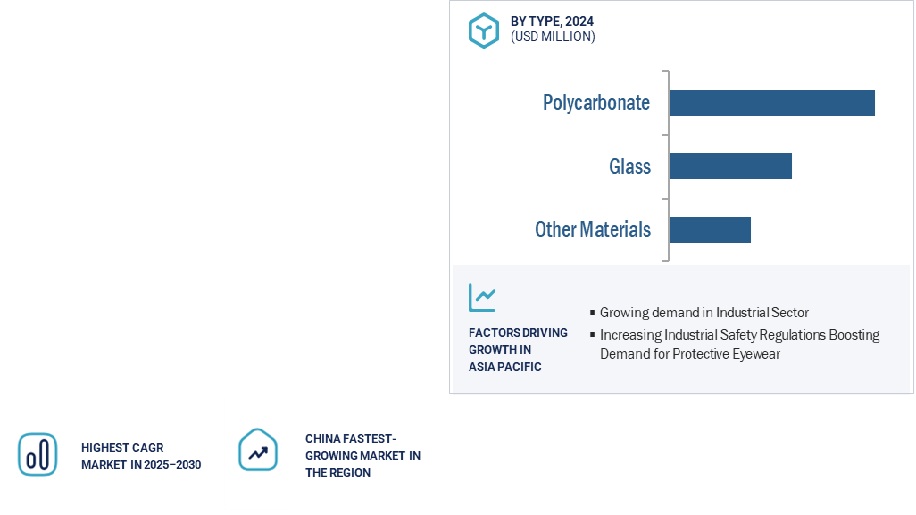
To know about the assumptions considered for the study, download the pdf brochure
Key Market Players
- 3M Company (US)
- Honeywell International (US)
- Uvex Group (Germany)
- Pyramex Safety Products (US)
- MCR Safety (US)
- ANSELL (Australia)
- Gateway Safety (US)
Recent Developments in Protective Eyewear Market
- In October 2021, Uvex Group launched the Uvex i-range, an innovative safety eyewear for multiple applications. The products comprise 3 different varieties uvex i-lite, uvex i-guard, and uvex i-guard plus. The products are coated with UV 400 protection.
- In October 2021, Uvex Group launched Uvex-Purefit, 100% recyclable safety spectacles. The goggles consist of polycarbonate. The goggles offer maximum protection with minimum weights.
- In June 2021, MCR Safety launched the new Memphis safety glass series. The company claims that these glasses protect eyes from UVA, UVB, and UVC rays. The glasses are coated with anti-fog lenses and UV cured, which provides 3 times more anti-fog performance than any other glasses.
To speak to our analyst for a discussion on the above findings, click Speak to Analyst
Frequently Asked Questions (FAQ):
What are the factors driving the growth of the Protective eyewear market?
The growing industrial sector drives the market
What are the major end use industry for Protective eyewear?
The major end use industry of Protective eyewear is industrial, healthcare, sports.
Who are the major manufacturers of protective eyewear?
3M Company (US), Honeywell International (US), Uvex Group (Germany), Pyramex Safety Products (US),MCR Safety (US), ANSELL (Australia), Gateway Safety (US) are the key players in the global protective eyewear market.
What are the reasons behind protective eyewear gaining market share?
protective eyewear are gaining market share due to increasing demand from the Asia Pacific region.
Which is the largest region in the protective eyewear market?
Asia Pacific is the largest region in the protective eyewear market.

The study involved four major activities in order to estimating the current size of the protective eyewear market. Exhaustive secondary research conducted to gather information on the market. The next step was to conduct primary research to validate these findings, assumptions, and sizing with the industry experts across the value chain. Both top-down and bottom-up approaches were used to estimate the total market size. The market size of segments and subsegments was then estimated using market breakdown and data triangulation.
Secondary Research
Secondary sources include annual reports of companies, press releases, investor presentations, white papers, articles by recognized authors, and databases, such as D&B, Bloomberg, and Factiva; and publications and databases from associations, including The American National Standards Institute (ANSI), The International Safety Equipment Association (ISEA), The International Commission on Non-Ionizing Radiation Protection (ICNIRP), The Occupational Safety and Health Administration (OSHA).
Primary Research
Extensive primary research was carried out after gathering information about protective eyewear market through secondary research. In the primary research process, experts from the supply and demand sides have been interviewed to obtain qualitative and quantitative information and validate the data for this report. Questionnaires, emails, and telephonic interviews were used to collect primary data. Primary sources from the supply side include industry experts, such as chief executive officers (CEOs), vice presidents (VPs), marketing directors, technology and innovation directors, and related key executives from various key companies and organizations operating in the protective eyewear market. Primary interviews were conducted to elicit information such as market statistics, revenue data collected from the products and services, market breakdowns, market size estimations, market forecasting, and data triangulation. Primary research also assisted in comprehending the various trends associated to product type, material, end – use industry, and region.
The breakup of Primary Research:
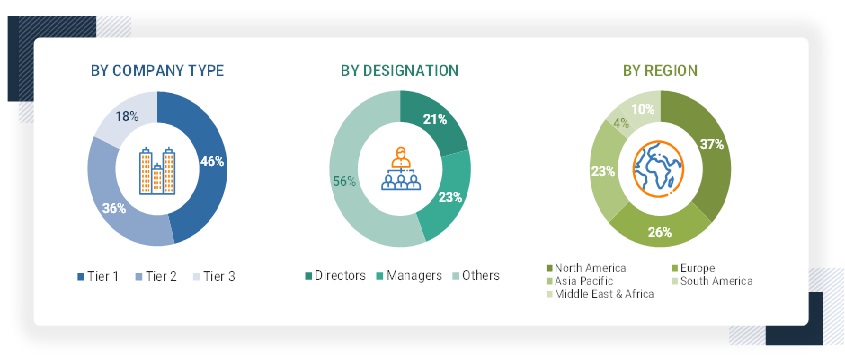
To know about the assumptions considered for the study, download the pdf brochure
PROTECTIVE EYEWEAR MANUFACTURERS
|
Protective Eyewear Manufacturers |
|
|
3M Company |
MCR Safety |
|
Honeywell International |
Ansell |
|
Uvex Group |
Gateway Safety |
Protective Eyewear Market Size Estimation
The following information is part of the research methodology used to estimate the size of the protective eyewear market. The market sizing of the protective eyewear market was undertaken from the demand side. The market size was estimated based on market size for protective eyewear in various technology.
Global Protective eyewear Market Size: Bottom-Up Approach and Top-Down Approach
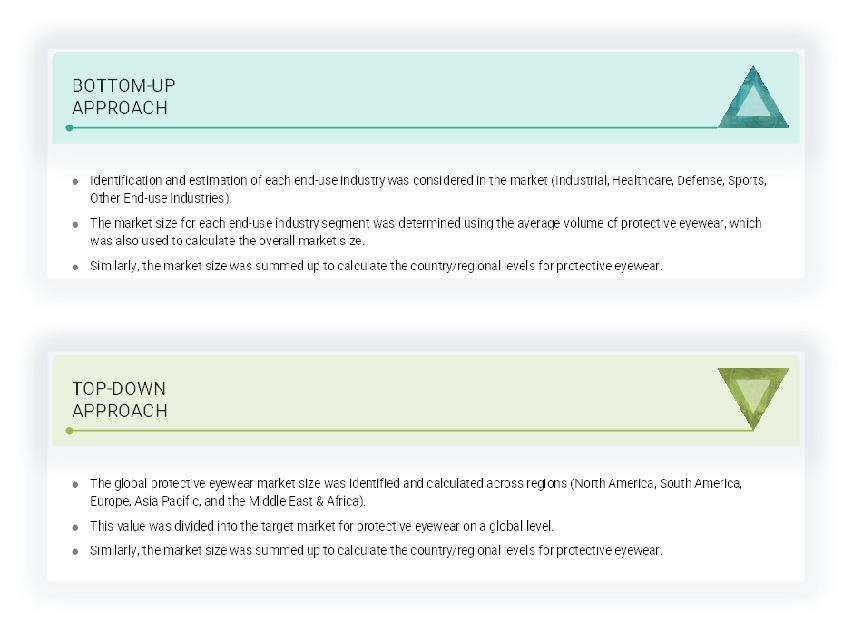
To know about the assumptions considered for the study, Request for Free Sample Report
Data Triangulation
After arriving at the overall market size, the market has been split into several segments. To complete the overall market engineering process and arrive at the exact statistics for all segments, the data triangulation and market breakdown procedures have been employed, wherever applicable. The data was triangulated by studying various factors and trends from the demand and supply sides. Along with this, the market size was validated using both the top-down and bottom-up approaches.
Market Definition
The protective eyewear market encompasses eyewear designed to safeguard the eyes from various hazards, including physical impacts, chemicals, UV rays, and intense light. Key product types in this market include safety spectacles, welding shields, and safety goggles, along with sports eyewear and UV-protective sunglasses. The market is driven by growing safety regulations across industries, increased awareness of eye health, and ongoing advancements in eyewear technology. As a result, the market is expected to experience steady growth, particularly in industrial, construction, healthcare, and sports sectors, where protective eyewear is essential for preventing eye injuries.
Key Stakeholder
- End User
- Raw Material Suppliers
- Senior Management
- Procurement Department
Report Objectives:
- To define, describe, segment, and forecast the size of the protective eyewear market based on Product type, material, end – use industry, and region.
- To forecast the market size of segments with respect to various regions, including North America, Europe, Asia Pacific, South America, Middle East & Africa, along with major countries in each region
- To identify and analyze key drivers, restraints, opportunities, and challenges influencing the growth of the protective eyewear market
- To analyze technological advancements and product launches in the market
- To strategically analyze micro markets, with respect to their growth trends, prospects, and their contribution to the market
- To identify financial positions, key products, and key developments of leading companies in the market
- To provide a detailed competitive landscape of the market, along with market share analysis
- To provide a comprehensive analysis of business and corporate strategies adopted by the key players in the market
- To strategically profile key players in the market and comprehensively analyze their core competencies
Available Customizations:
MarketsandMarkets offers the following customizations for this market report:
- Additional country-level analysis of the Protective Eyewear Market
- Profiling of additional market players (up to 5)
Product Analysis
- Product matrix, which gives a detailed comparison of the product portfolio of each company in the Protective Eyewear Market















Growth opportunities and latent adjacency in Protective Eyewear Market